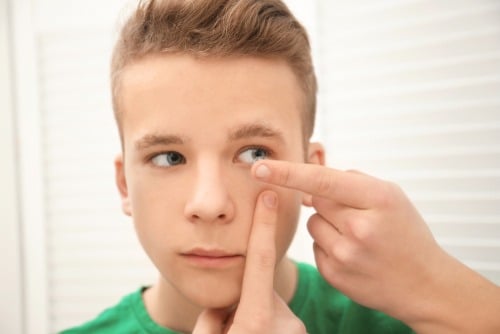Teen Eye Health: 13 to 18 Years of Age
For many teens, it’s common to not feel concerned about eye health; If you’re already in good health, it’s easy to believe you’ll always feel healthy and benefit from optimum vision.
But did you know, as a teen, your vision is still developing?
Even if you benefit from perfect 20/20 vision, your eyes are relying on you to take good care of them and protect them against injury or infection.
If you wear contacts, glasses or live with any vision issue – no matter how big or small – you’re already a little ahead of the curve, as you already know the importance of eye care and taking preventive health measures during your teenage years.
If you’re a parent reading this, you know that your teen’s vision is vital in supporting their living and learning needs since it is one of their most important senses. The teen years are a crucial time period to ensure your child is taking care of their vision.
Use this page to better understand teen eye health and the measures you can take – as a teen or parent – to ensure the eyes are being properly cared for.
View our comprehensive pediatric healthy eye exam service and schedule an annual eye exam today, or learn about our effective corrective optometric vision therapy programs:
Common Teen Eye Conditions
13-18 years old
The body is rapidly changing during the teenage years. Between the ages of 13 and 18 (on average), unique vision issues can develop, which are commonly linked to development during puberty.
Some of the most common teen eye issues include:
- Dry Eye Syndrome
- UV Light Damage
- Shortsightedness (Myopia)
- Farsightedness (Hyperopia)
- Astigmatism
- Sports-Related Injuries
- Digital Eye Strain
It’s important to note that any vision condition that a teen is contending with can be assessed and diagnosed during a quick, painless and comprehensive pediatric eye exam. From there, an effective and personalized treatment or prescription can be given to help achieve clear, comfortable vision.
To add to these eye conditions, poor nutrition can hurt a teen’s eyesight and cause unnecessary issues or worsen an already present eye condition. Read more about foods for teen eye health below.
If you think you’re dealing with digital eye strain from looking at blue-light emitting devices for too long, read how looking at screens all day affects eyesight:

How to Maintain Good Eyesight as a Teen
Need an overly simple reason to maintain healthy vision? You’ll need (and want) clear, comfortable vision for every activity you engage in.
From the classroom to the ball field, to driving and hanging out with friends, taking a few simple steps each day to ensure you’re protecting your vision and giving your eyes vital nutrients to thrive is a great way to keep great vision for many years to come.
Here are specific foods for teen eye health and eye health tips to consider to maintain good eyesight as a teen:
How Often Should Teens Schedule an Eye Exam?
It is recommended that teens ages 13 to 18 years of age have a comprehensive eye exam at least every two years if no vision correction is required.
Teens who need eyeglasses or contact lenses should be examined annually or as recommended by your eye doctor.
The iCare Vision Team Takes the Best Care of Teens’ Eyes to Ensure Healthy Vision
As a teen, you should know your eyes deserve the best and that your future vision depends on how you treat and nurture it today.
As a parent to a teen, we know you’re your child’s biggest advocate – especially when it comes to their health.
Let us help you take the best care of your eyes today and every day.
